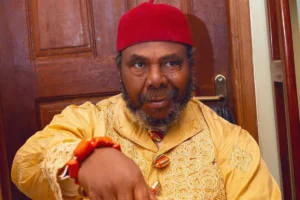How not to lead like politicians
[ad_1]
This is the season of politicking as politicians try all the tricks in the book to outwit one another with a view to either wresting power from the current holders or holding on to power. While there is no doubt about political office holders at various levels being classifiable as leaders, many of them are definitely cut in a mould different from that of corporate leaders. Consequently, they do not model the right kind of leadership for those who are not politicians.
How political leaders are different
Political leaders are different from corporate leaders in many respects.
Politicians make promises they don’t intend to keep
One thing that characterizes politicians is their ability to make promises from their lips and not their hearts. They make promises they have no intention of keeping. A politician can promise to build a bridge where there is neither a river nor a stream, or build a helipad in a non-flying community. He has no qualms promising to ensure that the sun shines or that the rain does not fall. A politician can promise to do things he has absolutely no control over. The essence of this is to hoodwink the people to get their votes. They, however, often forget that they have to return to the people to renew their mandate at the appropriate time. That is why the average politician is not respected by the electorate because they know that all he wants is their votes.
That is a trap a corporate leader should avoid. A corporate leader should always keep his promises. But beyond that, as a rule, a corporate leader should always under-promise and over-deliver. A leader should restrain from telling his people all the goodies he has for them. He should always leave room for surprises which is only possible when he does not reveal upfront all that he intends to do. Everyone loves pleasant surprises. So, keeping part of the plans close to your chest is a good strategy. It is much better than making promises that are difficult to keep.
So, a corporate leader should promise less and strive to do much more than he has promised. This is a sure way of earning the respect of the followers because they know that unlike a politician, once the leader has spoken, it is a done deal. It is a promise they can take to the bank.
Politicians are competitive, not distinctive
Politicians are driven by competition. Hence, they are combative. They are wont to compare themselves and their parties with others. When they go out to canvass for votes, they don’t stay the course; they digress into character assassination and derogation of their opponents. They hurl insults at those opposed to their position because their minds have been held hostage by competition.
A corporate leader should not travel that road. Rather than worry about competition, his concern should be distinction. A corporate leader who is too concerned about competition will soon derail. The fact is that unless it is a monopoly, there will always be competition. Even if you are able to run a particular competitor out of business, several others will spring up. So, why bother? Instead of keeping sleepless nights wondering what the competition is doing or not doing, a wise corporate leader will concentrate on those things that make his organization distinct from the crowd. His concern is how he will improve on his unique selling proposition and deliver greater values to his customers. Worrying about competition is not in the reckoning of a corporate leader who knows where he is headed.
In politics, it is winner-takes-all
A politician hardly ever has a thought for the other party. It has to be about him always. He must get all the attention, all the commendations and all the perks. He either has his way or everybody else can take a dive into the lake. A politician is not wired for negotiations; he is more predisposed to giving ultimatums. That is why he can go to any length to have his ambition realized. Once this is done, he does not share the glory with anybody. Politicians are sold out on winner-takes-all philosophy because they believe that somebody else’s gain is their loss. So, they move all out to stop the other party from having any gain at all.
For a corporate leader, winner-takes-all mentality is not only vicious but also poisonous. What works in the corporate world is a win-win mentality, which is also known as the live and let live attitude. In the corporate world, taking an unwavering stance is outdated. What works is negotiation with all the parties involved willing to make concessions. This is important because a wise corporate leader is not out to make others cry to their offices while he smiles to the bank. Rather, he gives others reasons to be happy too. So, he does not want to make all the profits or close all the deals while others pine away and bite their finger nails. That is why sometimes banks collaborate to finance a project. With that everybody has something to be happy about.
Politicians don’t value relationships
The average politician often dumps many of his associates, with whom he had campaigned, shortly after the election. These are people who had worked together with the politician sometimes for over a year before the election. As soon as the elections are over, they no longer have access to him. They are not even welcome in his home or office. He does not pick their calls and does everything possible to dissociate himself from them.
A corporate leader builds relationships. He knows that whatever he is able to get is a function of the relationships he is able to build. He is not under any illusion that the worth of his organization is directly proportional to the quality of relationships it is able to build with the outside world. Knowing that everyone he comes across can add value to his business or endeavours, a corporate leader never abandons his people unless it becomes inevitable. He treats people well, gives them a sense of belonging and cares about their concerns. He does not abandon them after using them to accomplish his vision. As a matter of fact, he does not have a vision separate from that of the people he is working with because whatever vision the leader pursues is owned jointly with the people.
ALSO READ FROM NIGERIAN TRIBUNE
Apart from those who work with the leader on a regular basis, he also has to build relationships with the outside world. One way to do this is to notice ‘what’s on the walls’. IBM popularized this concept. It taught its sales staff to always pay attention to what individuals put on the walls in their offices; pictures, trophies, certificates and make it a point of duty to comment on these when they go visiting. The rationale is that for a person to hang something on his wall in the office for the world to see, it must hold a special place in his heart. Making comments that elicit discussions on what is important to him is a way of ensuring bonding and building trust.
Another way of building relationships is staying in touch over time. A good leader does not remember people only when he needs them but makes it a point of duty to keep in minds dates that are important to these people.
Politicians present themselves as the needy rather than the needed
When canvassing for votes, politicians present themselves as the needy, not the needed. They go to the electorate literally cap in hand begging for votes. This is so because they rely much on sentiments. They whip up issues of sentiments such as religion, ethnicity, club association etc. It is because they lean so much on sentiments that they make promises that are hard to fulfill. They tell the electorate what they think they want to hear, not what they need to hear. They promise to create jobs because they know that will scintillate the voters but they never remember to say how they will achieve it. They promise to improve the education system because they know that will resonate with the electorate but conveniently leave out how this can be done. They offer to build affordable houses for the masses because they know the masses need housing but they never get to the point of how this will be achieved.
But a corporate leader does not do that. Instead of playing the card of sentiments, he goes to his clients with solutions. He knows that the market is rational, not impersonal or emotional. It is not moved by sentiments; rather its reactions are determined by sound judgments. The market goes with whoever is able to offer the required solutions, irrespective of gender, race or religious persuasion. A wise corporate leader understands this and arms himself with solutions, instead of playing on emotions. He works his heart out in a bid to come up with solutions that will position his organization as what the market needs. He goes to his clients as the needed, not as the needy or the tolerated.
Politicians employ divide and rule strategies
Most politicians have caucuses and camps in their groups. It is as if they are not comfortable with everyone being on the same page. To avoid a possible gang-up against him, a politician creates crises among his followers and plays one side against the other.
This is a risk that cannot be contemplated by a corporate leader. He knows the value of each of the people and knows that he needs each of them to get to the desired future. So, he is more interested in ensuring unity than in creating crisis. A corporate leader builds a strong and united team, not a divided and weakened one.
Politicians think short term
In 1759, when Arthur Guinness wanted to start his brewery, he found the St. James’s Gates Brewery suitable and persuaded the owner to agree to a 9,000-year lease. He took this decision because his vision was beyond his personal interest. He was motivated to do what he did because he was thinking about the business beyond what it could do for him, he was thinking about building a legacy, an organization that would bestow on him immortality. But that is not the thinking of many politicians. A whole lot of politicians live for the moment, they are not bothered about building any legacy. They are motivated by pride, egged on by avarice and propelled by self-preservation. So, they do not take the pains to build anything that can stand the test of time. While great leaders give their present to secure the future of others, for politicians, that is too high a price to pay.
Last line
To etch your footprints on the sands of time, refrain from leading like the average politician.
[ad_2]















Post Comment